News Archive
Yannick Hopf receives SSCS Predoctoral Achievement Award
- Monday, 6 March 2023
At the 2023 International Solid-State Circuit Conference (ISSCC), Yannick Hopf was awarded a Predoctoral Achievement Award from the IEEE Solid-State Circuit Society (SSCS). ISSCC is the leading conference for solid-state circuits and took place on 19 – 23 February. The Predoctoral Achievement Award is the highest honor the society bestows upon student members and awarded to promising graduate students based on their academic record.
In the course of his PhD, Yannick has worked on ASICs for 3D ultrasound imaging of the heart. Two prototypes have been successfully developed and evaluated for the use in intra-cardiac catheters. The work has led to innovations in several circuit blocks as well as on the system level. The final design is the first to combine high-voltage transmitters, analog front-ends, micro-beamforming, digitization, datalinks and transducers, enabling high-frame-rate 3D imaging.
Yannick works at the Smart Ultrasound group at the Electronic Instrumentation Laboratory, under supervision of Dr. Ir. Michiel Pertijs, in close collaboration with the Acoustical Wavefield Imaging group at the Faculty of Applied Sciences, and the Biomedical Engineering group at Erasmus MC. Yannick's work is part of the 3D-ICE project.
More ...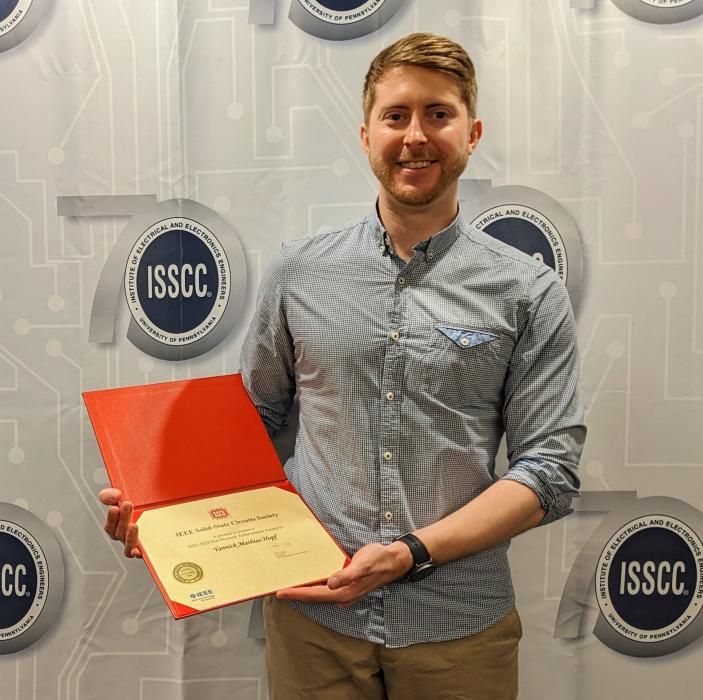
Yannick Hopf receives Best Presenter Award at PRORISC
- Tuesday, 16 August 2022
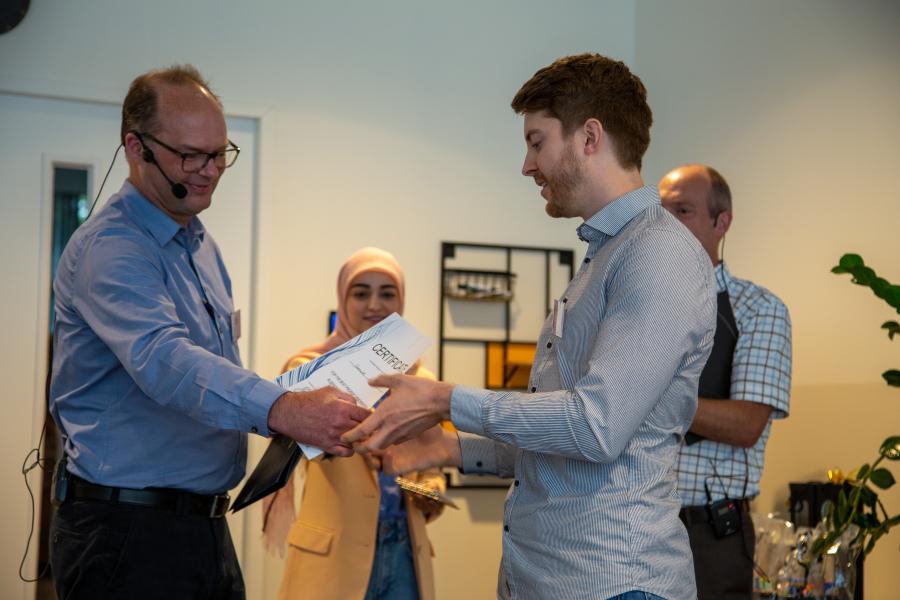
At the 2022 PRORISC Conference, Yannick Hopf was awarded the Best Presenter Award in the category Sensing and Low Power. PRORISC, an annual conference on Integrated Circuit design, was held in Enschede on July 14 and 15.
Yannick presented his work on an ASIC for 3D ultrasound imaging of the heart. The ASIC is intended for use in an intra-cardiac catheter. The design is the first to combine high-voltage transmitters, analog front-ends, micro-beamforming, digitization and transducers, enabling high-frame-rate 3D imaging. Its pitch-matched architecture, made possible by a shared SAR/slope ADC that is 4x smaller and consumes 1.5x less power than the prior art, makes it a scalable solution for future digital imaging catheters.
Yannick works at the Ultrasound ASICs group at the Electronic Instrumentation Laboratory, under supervision of Dr. Ir. Michiel Pertijs, in close collaboration with the Acoustical Wavefield Imaging group at the Faculty of Applied Sciences, and the Biomedical Engineering group at Erasmus MC. Yannick's work is part of the 3D-ICE project.
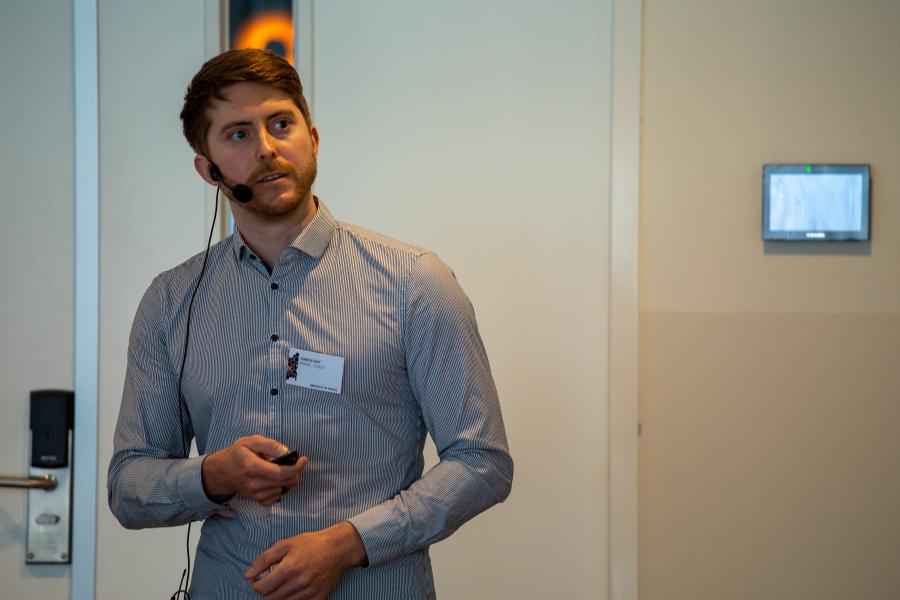
Chao Chen receives Open Mind Grant
- Tuesday, 28 September 2021
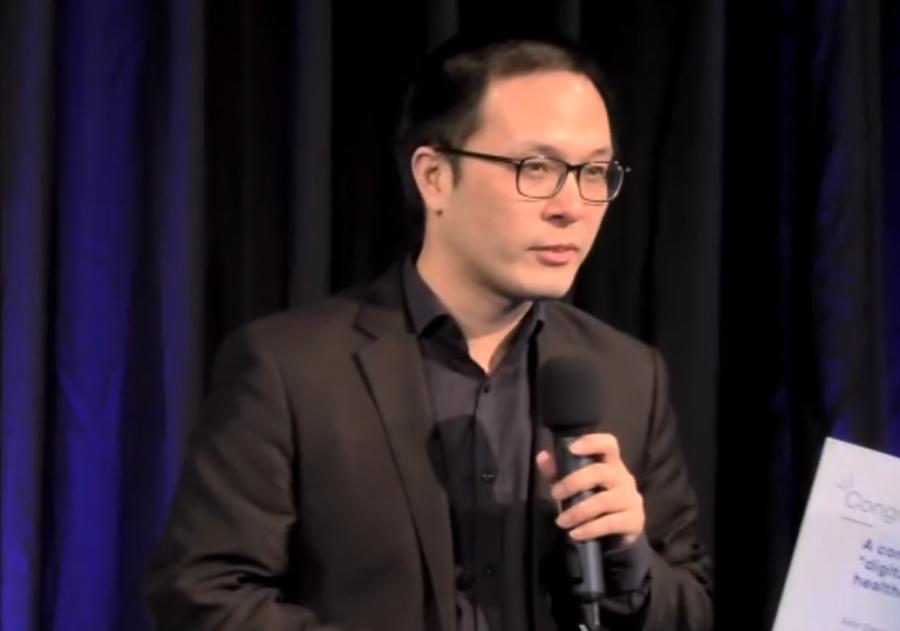
On Friday Sept. 17, 2021, Chao Chen pitched his research proposal
ULTRAPROBE: Ultrasensitive digital probe for transcranial ultrasound imaging of the brain
during the first Open Mind Symposium. Chao is working as a postdoc in Michiel Pertijs' Ultrasound ASICs group at the Electronic Instumentation Lab.
Chao’s proposal, written together with Dr. Pieter Kruizinga of Erasmus MC, is among the 17% winning proposals of the Open Mind Call 2021, and is a nice example of convergence between Erasmus MC and TU Delft. It aims to make a breakthrough in functional ultrasound imaging of the brain, by developing novel instrumentation to deal with the attenuation and aberrations introduced by the skull.
More information can be found on the Open Mind Symposium webpage: https://convergencealliance.nl/open-mind-symposium-2021/
More ...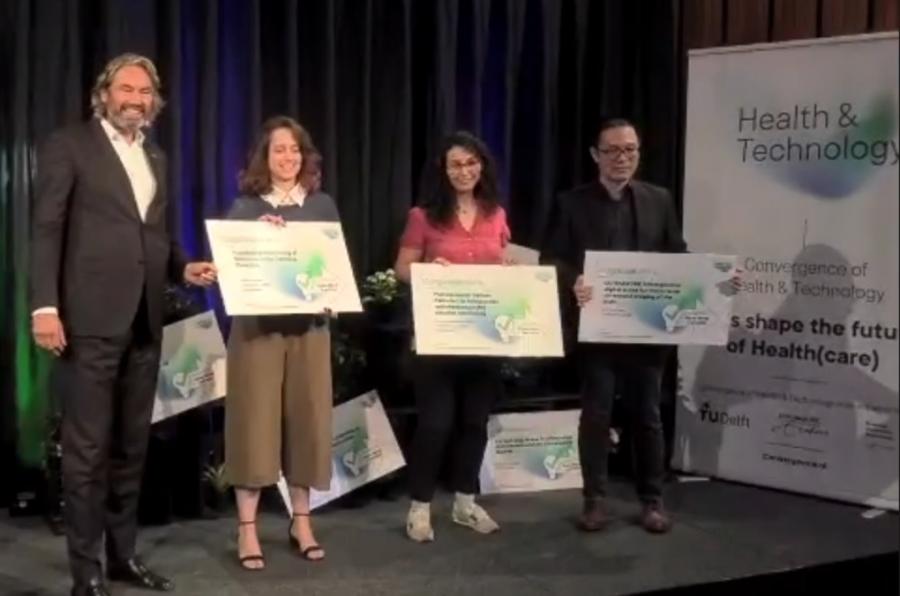
Michiel Pertijs will present at ESSCIRC/ESSDERC Virtual Educationals
- Friday, 4 September 2020
Michiel will contribute to the upcoming ESSCIRC/ESSDERC Virtual Educational events (see https://www.esscirc-essderc2020.org/educationals). He will give an invited talk in the Workshop on Emerging Solutions for Imaging Devices, Circuits and Systems. In his talk, Michiel will show how integrated circuits play an enabling role for the next generation of smart ultrasound devices. The ESSCIRC/ESSDERC Virtual Educational events are available online between Sept. 7 and Oct. 16, with a live sessions on Sept. 14 and 15.
More ...
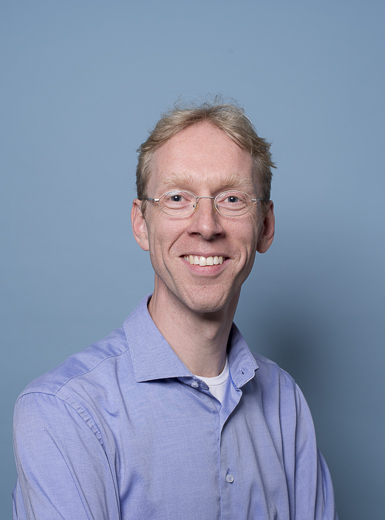
Chao Chen receives Else Kooi Award
- Sunday, 7 July 2019
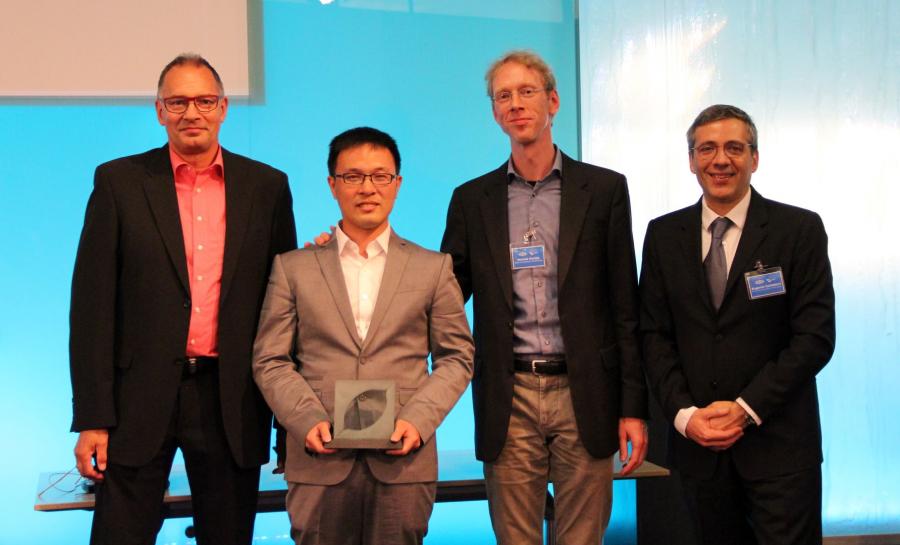
The 2019 Else Kooi Award goes to EWI alumnus Chao Chen, for his work on chips for miniature 3-D ultrasound probes. The Else Kooi Award is a yearly prize for outstanding young researchers in the microelectronics field in The Netherlands. Chao received the award, which consists of prize of € 5.000 and a work of art, at the PRORISC Conference in Delft on July 4.
Chao’s PhD was a multi-disciplinary project on the intersection between electronics and ultrasonic imaging, aiming to realize miniature ultrasound probes for 3-D medical imaging. In particular, he worked on endoscope-based probes for real-time 3-D imaging of the human heart. Such probes are an important step forward compared to current 2-D imaging devices. They will provide improved diagnosis of cardiac conditions and guidance of minimally-invasive procedures.
To realize such probes, more than 1000 tiny elements that can send and receive ultrasound need to be integrated in a mm-sized probe tip. Chao developed custom chips that make it possible to connect all these elements using a limited number of cables to an imaging system. To locally process the echo signals, his chips employ innovative amplifiers and beamformer circuits that are substantially smaller and more power efficient than previous designs. Moreover, Chao realized the first chip capable of digitizing the echo signals in the probe, enabling better image quality with fewer cables, and making an important step towards next-generation smart ultrasound probes.
Chao’s work was carried out at Ultrasound ASICs group at the Electronic Instrumentation Laboratory, under supervision of Dr. Ir. Michiel Pertijs, in close collaboration with the Acoustical Wavefield Imaging group at the Faculty of Applied Sciences, and the Biomedical Engineering group at Erasmus MC. Chao's work was part of the MICA project. His PhD thesis can be found here. Chao now works at Butterfly Network, an American company developing hand-held ultrasound scanners.
More ...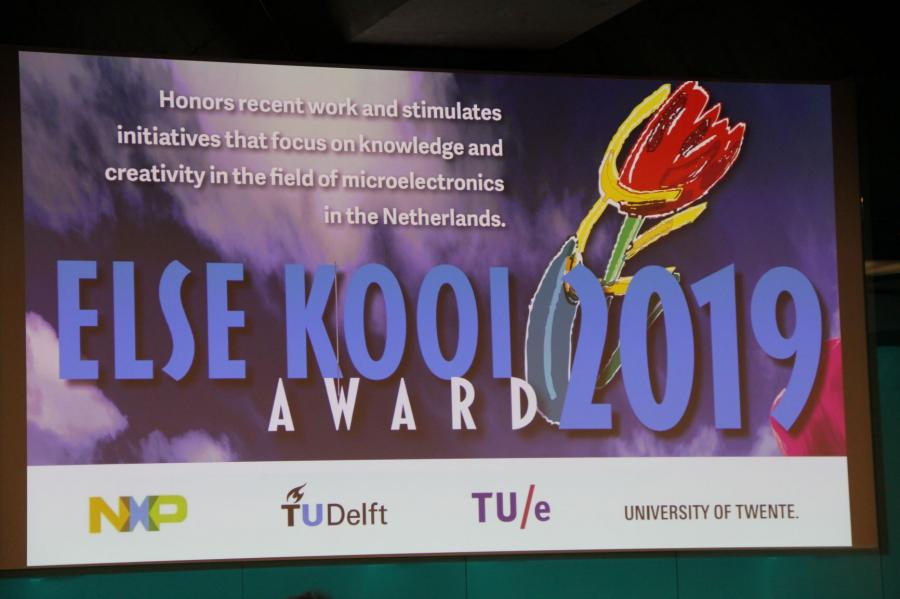
Jing Li presents Ultrasound Receiver with Pitch-Matched ADCs at VLSI
- Thursday, 20 June 2019
At the 2019 VLSI Circuits Symposium in Kyoto, Japan, Dr. Jing Li of the Ultrasound ASICs group presented an ultrasound receiver ASIC in 180nm CMOS that enables element-level digitization of echo signals in miniature 3D ultrasound probes. It is the first to integrate an analog front-end and a 10-b Nyquist ADC within the 150μm element pitch of a 5-MHz 2D transducer array. To achieve this, a hybrid SAR/shared-single-slope architecture is proposed in which the ramp generator is shared within each 2×2 subarray. The ASIC consumes 1.54mW/element and has been successfully demonstrated in an acoustic imaging experiment.
Jing Li spent one year as visiting researcher in Michiel Pertijs' Ultrasound ASICs group at the Electronic Instrumentation Laboratory. He is now with the University of Electronic Science and Technology of China, Chengdu, China.
More ...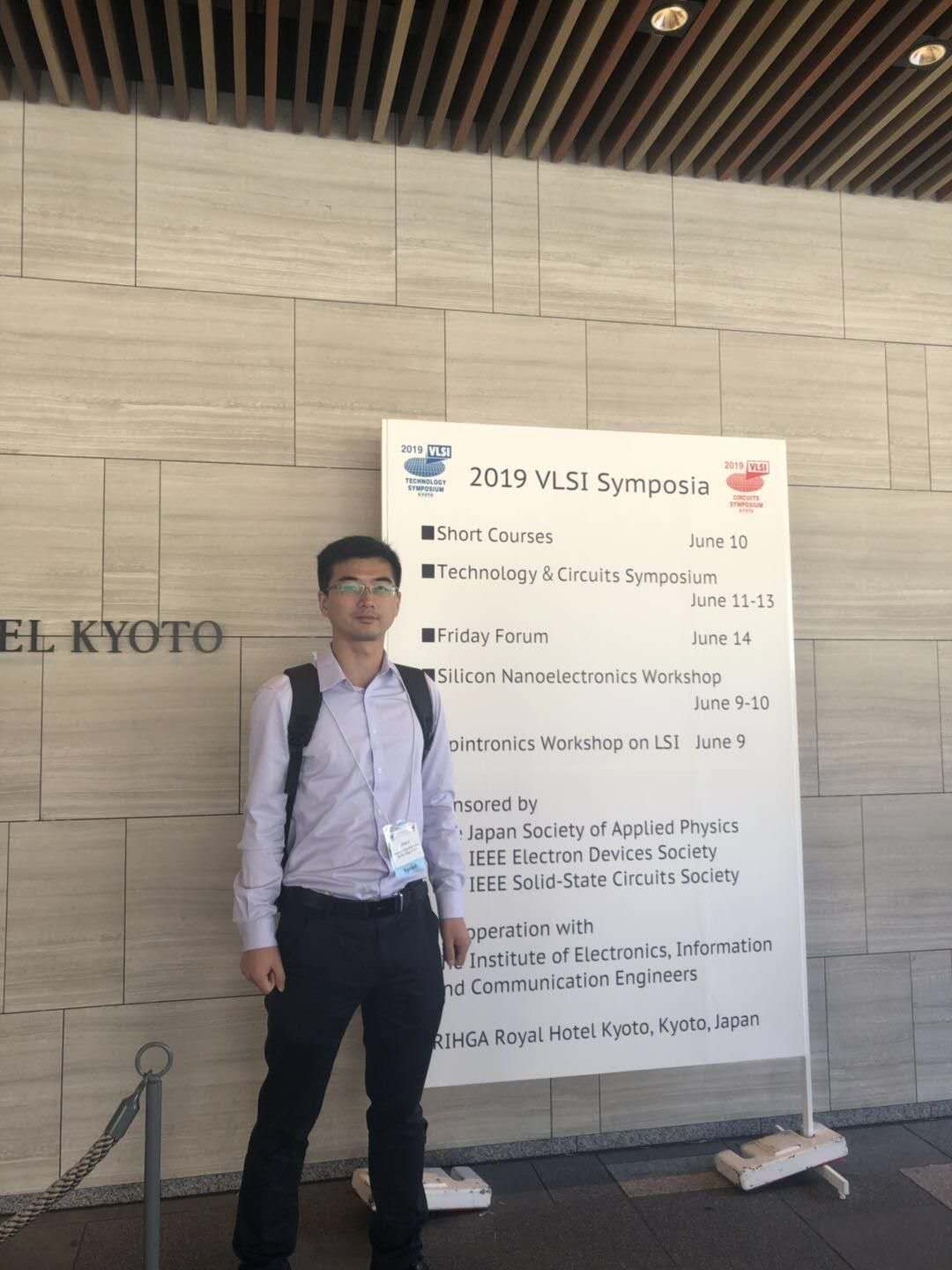
ULIMPIA Workshop
- Wednesday, 30 January 2019
On January 7 and 8, 2019, the Ultrasound ASICs group organized a workshop of the ULIMPIA project at Delft University of Technology. In this PENTA project, together with our partners from The Netherlands, Germany, Finland, Belgium, France and Spain, we develop a technology platform for the next generation smart body patches.
More information can be found on the ULIMPIA project website.
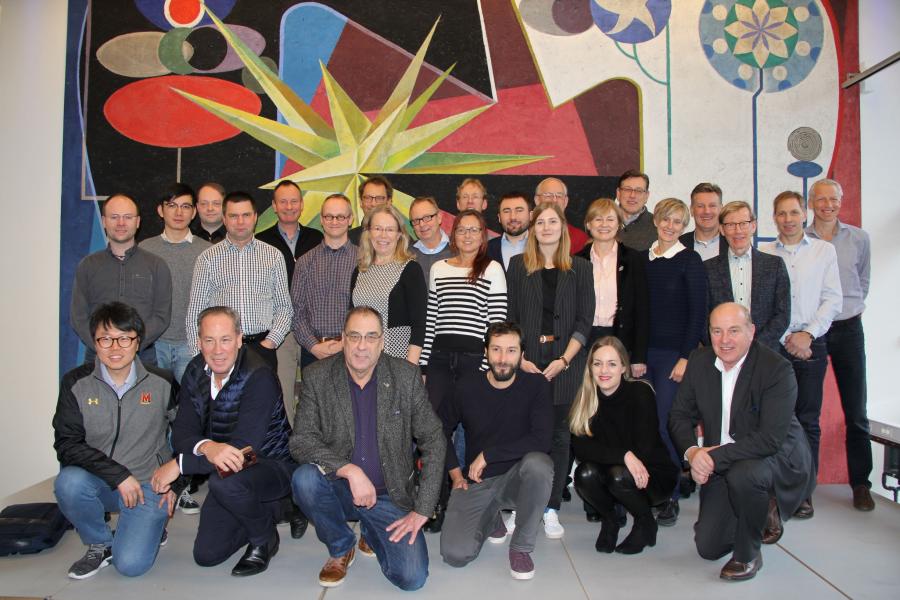
Health Prototype Grant for Single-Cable Ultrasound Catheter
- Wednesday, 30 January 2019
Verya Daeichin, Douwe van Willigen, Martin Verweij, Michiel Pertijs and Nico de Jong received a Health Prototype Grant of €10K from the Delft Health Initiative for their project on a “Single-cable three-dimensional opto-acoustic imaging catheter”. The objective of the TU Delft Health Initiative is to promote research in the field of Healthcare at Delft University of Technology. Out of a total of 26 applications, 13 were granted.
Minimally-invasive interventions have revolutionized the healthcare industry, allowing outpatient clinical treatment, which is critical for healthcare in an aging population. Ultrasound imaging is one of the modalities that can fulfil all the requirements for these interventions: it is safe, cheap, real-time and can be made in small devices. Recently we have demonstrated catheter-based imaging devices and their potential, in context of the Perspectief Programme “Instruments for Minimally-Invasive Techniques (iMIT)”.
One of the main challenges in a catheter-based ultrasound imaging device is the number of cables required to connect the ultrasound elements to the imaging system (typically 64-128 cables). Therefore, it is extremely valuable to keep the number of interface connections limited to facilitate a more flexible probe shaft and to leave room for other required pieces such as a guidewire and/or an optical fiber. To address the challenge of miniaturizing 3D ultrasonic imaging devices within the stringent size constraints of a catheter, we have developed an application-specific integrated circuit (ASIC) of 1.5 mm by 1.5 mm which can handle a matrix of 64 ultrasonic transducers elements using only a single cable to generate a real-time 3D ultrasound images. We have realized a prototype of this device on a PCB and have shown its imaging capabilities. The research goal of this proposal is to demonstrate our unique technology in a form that is significantly closer to the final clinical application: integrated at the tip of a small cylinder and connected using a single micro-coax cable.
This project is a collaboration between the Ultrasound ASICs group of the Electronic Instrumentation Laboratory, and the Acoustic Wavefield Imaging group. It fits in the scope of our activities on devices for intra-vascular ultrasound (IVUS).
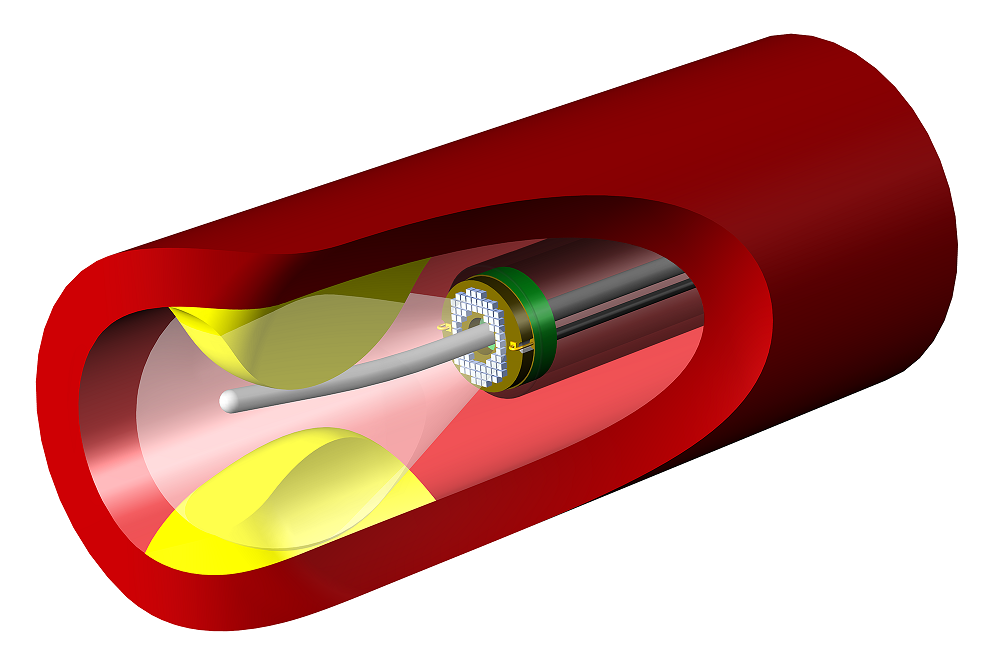
Microelectronics at work for sustainable healthcare
- Saturday, 19 January 2019
The Medical Delta has launched twelve research programmes that work on technological solutions for sustainable care. EEMCS is represented in three programmes; Neurodelta (Wouter Serdijn), Medical Delta Cardiac Arrhythmia Lab (Wouter Serdijn and Alle-Jan van der Veen) and Ultrafast Ultrasound for the Heart and Brain (Michiel Pertijs), all part of the Microelectronics department.
In order to give the research programmes an extra impulse, a strategically important project is financed within each research programme.
In the Medical Delta 2.0 Neurodelta program Vasiliki Giagka and Wouter Serdijn (both Section Bioelectronics) will work on miniature implants for simultaneously measuring and influencing brain activity by means of light and ultrasound.
Read more about Vasiliki Giagka's work: https://www.tudelft.nl/ewi/actueel/nodes/stories/elektrische-implantaten/
Within the Medical Delta 2.0 Cardiac Arrhythmia Lab, Virgilio Valente (Section Bioelectronics) and Richard Hendriks and Borbala Hunyadi (both Section CAS) will work on new bioelectronic signal acquisition and processing techniques to identify the electropathology of cardiac dysrhythmia, such as atrial fibrillation, in an organ-on-chip set-up.
Read more about the work of Virgillio Valente: https://bme.weblog.tudelft.nl/2018/12/11/biocmos/
Within the Medical Delta 2.0 programme Ultrafast Ultrasound for the Heart and Brain, Michiel Pertijs (Section Electronic Instrumentation) will work on smart ultrasound probes that can take 3D images of the heart and brain at high speed, with the aim of enabling new and better diagnostics of cardiovascular and neurological disorders.
Read more about the work of Michiel Pertijs: https://www.tudelft.nl/ewi/actueel/nodes/stories/echos-uit-een-pleister/
More information about Medical Delta: www.medicaldelta.nl/news/overzicht-programmas-medical-delta-20192023

Perspectief Programme ULTRA-X-TREME Granted
- Friday, 16 November 2018
Ultrafast Ultrasound Imaging for Extended Diagnosis and Treatment of Vascular Disease (ULTRA-X-TREME)
NWO (the Netherlands Organisation for Scientific Research) has announced the new research programmes that will be part of its ‘Perspective for Top Sectors' funding programme. One of the programmes that will be funded is the ULTRA-X-TREME programme, in which new ultrasound techniques will be developed for improved diagnosis of dangerous vascular problems. Michiel Pertijs' Ultrasound ASICs group at the Electronic Instrumentation Laboratory will be responsible for the development of advanced integrated electronics for the high-frame-rate 3D ultrasound probes that will play a key role in this programme.
Vascular problems can be life-threatening. Cerebral infarctions (strokes) are often caused by calcification of the carotid artery and ruptures in the abdominal artery (aortic aneurysms) as a result of a weakening of the arterial wall. Currently, doctors determine the likelihood of both problems simply by measuring the diameter of these arteries. However, this has proved to have only limited predictive value, which means more people than necessary undergo life-threatening treatments and dangerous cases are overlooked.
The ULTRA-X-TREME programme will develop new, highly accurate ultrasound techniques to enable 3D imaging of the arterial walls and blood flow. New transducers, contrast media and analysis techniques will be developed in order to determine much more effectively whether treatment is necessary.
The ULTRA-X-TREME consortium brings together the best Dutch research groups in the field of ultrasound technology and the biomechanics of blood vessels with hospitals and international industry. Within this programme, Michiel Pertijs will work together with Nico de Jong and Martin Verweij (Imaging Physics, Fac. of Applied Sciences) and Hans Bosch (Erasmus MC) on the development of a unique matrix transducer with more than 20,000 elements and integrated electronics, for making 3D echo images with a high volume frame rate.
Programme leader: Prof. dr. ir. C.L. de Korte (Radboudumc and Twente University)
Participants: ANSYS, Bracco Suisse S.A., Catharina hospital, Erasmus MC, Harteraad, Mindray, Nederlandse Vereniging voor Vaatchirurgie (NVVV), Philips Electronics Nederland, Pie Medical Imaging, Radboudumc, Rijnstate hospital, TU Delft, TU Eindhoven, TOMTEC Imaging Systems, Twente University, Vermon S.A., Verasonics
More ...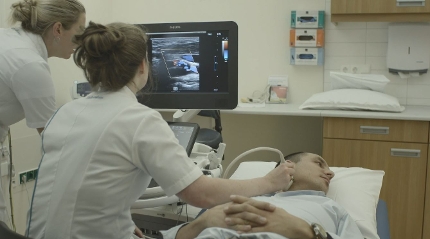
Our work on Intravascular Ultrasound featured on the cover of TUFFC
- Thursday, 8 November 2018
The IEEE Transactions on Ultrasonics, Ferroelectrics, and Frequency Control selected our paper
- J. Janjic, M. Tan, E. Noothout, C. Chen, Z. Chan, Z. Y. Chang, R. H. S. H. Beurskens, G. van Soest, A. F. W. van der Steen, M. D. Verweij, M. A. P.
Pertijs, and N. de Jong, "A 2D ultrasound transducer with front-end ASIC and low cable count for 3D forward-looking intravascular imaging: Performance
and characterization," IEEE Transactions on Ultrasonics, Ferroelectrics, and Frequency Control, vol. 65, no. 10, pp. 1832-1844, Oct. 2018 (link)
to be featured on the cover of the October 2018 issue.
This paper is the result of a collaboration on intravascular ultrasound imaging between the Ultrasound ASICs group at the Electronic Instrumentation Lab, the Thoraxcenter at Erasmus MC, and the Laboratory of Acoustical Wavefield Imaging at the Faculty of Applied Sciences, Delft University of Technology.
Forward-looking intravascular ultrasound (FL-IVUS) holds rich potential for guidance of complex vascular interventions, such as recanalization of coronary chronic total occlusions. The realization of FL-IVUS devices is fraught with technical challenges, as a high-resolution volumetric image needs to be created from a small (< 1.5 mm) aperture with scant space for cabling and electronics. In this issue of the Transactions, we present an innovative concept for an FL-IVUS matrix array, consisting of 16 transmit (yellow) and 64 receive elements (red), addressed by only four cables. A dedicated front-end ASIC performs element addressing and received signal amplification. The realized configuration produces a narrow pulse-echo beam profile with sidelobes below −20 dB. 3-D synthetic aperture imaging (bottom) at a volume rate of 100 Hz is feasible.
Details on the ASIC, which was designed at the Electronic Instrumentation Lab by Mingliang Tan, Chao Chen, Zhao Chen and Michiel Pertijs, can be found in
- M. Tan, C. Chen, Z. Chen, J. Janjic, V. Daeichin, Z. Y. Chang, E. Noothout, G. van Soest, M. D. Verweij, N. de Jong, and M. A. P. Pertijs, "A front-end ASIC with high-voltage transmit switching and receive digitization for 3D forward-looking intravascular ultrasound imaging," IEEE
Journal of Solid-State Circuits, vol. 53, no. 8, pp. 2284-2297, Aug. 2018 (link)
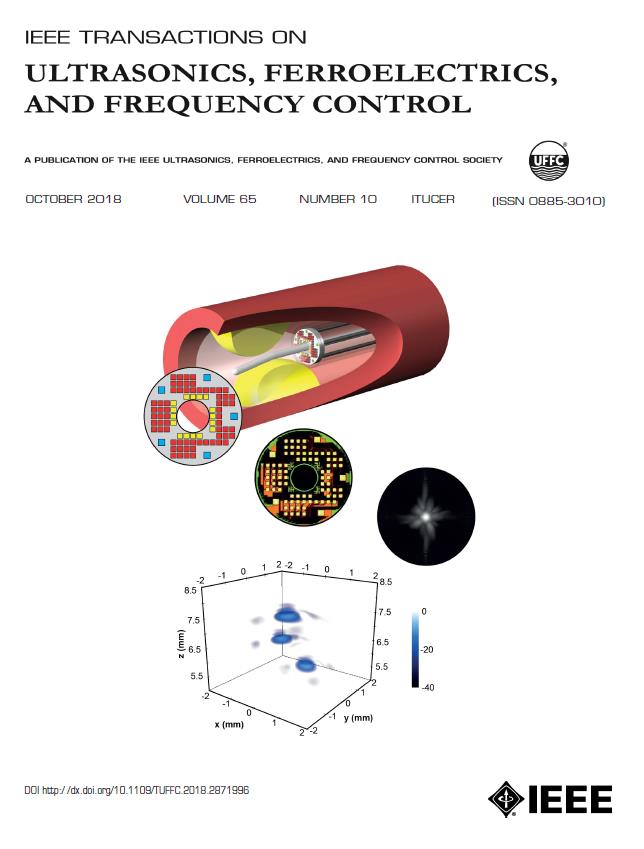
Six papers at the 2018 IEEE Ultrasonics Symposium
- Tuesday, 6 November 2018
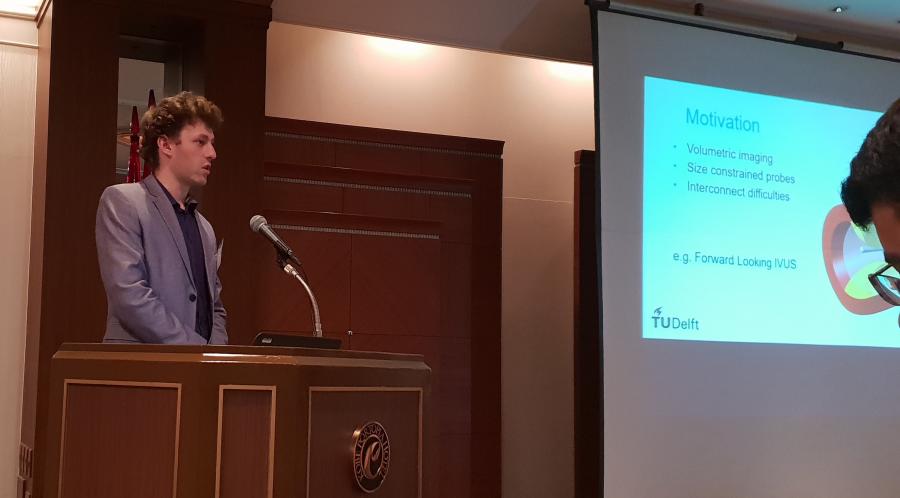
At the 2018 IEEE Ultrasonics Symposium (IUS) - the world’s premier conference on ultrasound research held in Kobe, Japan, in October - the Ultrasound ASICs group presented six papers covering various aspects of our work on integrated circuits for smart ultrasound applications.
Douwe van Willigen presented two papers at IUS. The first, entitled “ASIC design for a single-cable 64-element ultrasound probe”, was nominated for the Best Student Paper Competition (top 3.5% of the student paper submissions). In this paper, we present an ASIC (Application-Specific Integrated Circuit) that interfaces 64 piezoelectric elements directly integrated on top of the ASIC to an imaging system using a single micro-coaxial cable. This innovative design allows a single-element transducer to be replaced by a transducer array, while using the same cable, making it a promising solution for 3D imaging with size-constrained probes. This work is part of our work on intra-vascular ultrasound , a collaboration with the Acoustical Wavefield Imaging Lab (Faculty of Applied Sciences, Delft University of Technology) and the Thoraxcenter, Erasmus MC, Rotterdam.
A second paper authored by Douwe, “Minimizing the zero-flow error in transit time ultrasonic flow meters”, presents results of our FLOW+ project, analysing the effect of driver- and readout electronics on the zero-flow error in transit-time ultrasonic flow meters.
Another paper that links to the same FLOW+ research project, entitled “Feasibility of ultrasound flow measurements via non-linear wave propagation,” was presented by Jack Massaad. This paper demonstrates the feasibility of using non-linear wave propagation to improve the precision of flow measurements using ultrasound.
Zhao Chen presented a paper entitled “A Power-Efficient Transmit Beamformer ASIC for 3-D Catheter-Based/ Endoscopic Probes”, which presents an innovative approach to reduce the power consumption of integrated high-voltage pulsers in miniature ultrasound probes.
Zhao also presented a paper entitled “A quantitative study on the impact of bit errors on image quality in ultrasound probes with in-probe digitization”, in which we investigate an import question associated with the next-generation of digital ultrasound probes: if you digitize the echo signals in the probe, what are then the bit-error requirements on the digital datalink used to send the echo signals to an imaging system? We’ve found that very high bit-error rates can be tolerated without significant impact on image quality, opening the door to the use of simple and power-efficient datalink solutions.
Finally, Mehdi Soozande presented a paper entitled “Virtually Extended Array imaging improves lateral resolution in high frame rate volumetric imaging,” in which we describe a high-frame-rate transmission scheme which outperforms alternative methods in lateral resolution, targeting catheter-based 3D imaging applications.
More ...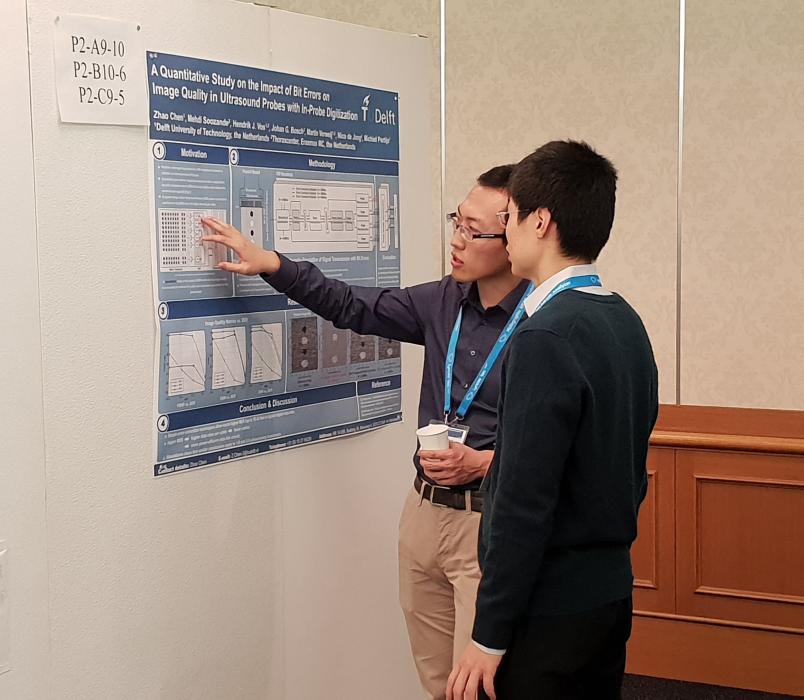
Zhao Chen wins second prize in SSCS Benelux Chip Design Contest
- Monday, 28 May 2018
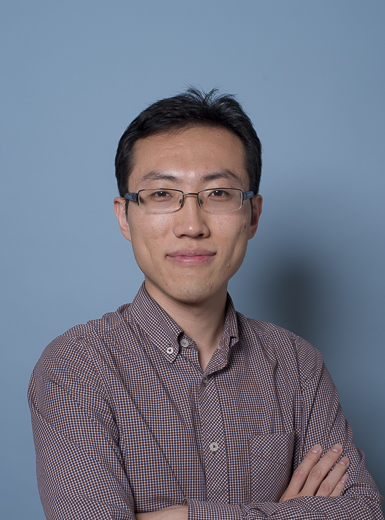
For the third year, the IEEE SSCS Benelux Chapter organized a Chip Design Contest for MSc and PhD students in the Benelux. This year, the second prize was won by Zhao Chen, for his contribution “A Front-End ASIC with Integrated Subarray Beamforming ADCs for Miniature 3D Ultrasound Probes”. Zhao received the award at the 2018 SSCS Benelux Chip Design Workshop, which was held at the University of Leuven on May 22, 2018.
More details on Zhao’s award-winning work can be found in the following paper: C. Chen, Z. Chen, D. Bera, E. Noothout, Z. Y. Chang, M. Tan, H. J. Vos, J. G. Bosch, M. D. Verweij, N. de Jong, and M. A. P. Pertijs, “A 0.91mW/element pitch-matched front-end ASIC with integrated subarray beamforming ADC for miniature 3D ultrasound probes,” in Dig. Techn. Papers IEEE International Solid-State Circuits Conference (ISSCC), pp. 186-188, Feb. 2018.

PhD Defense Chao Chen
- Tuesday, 3 April 2018
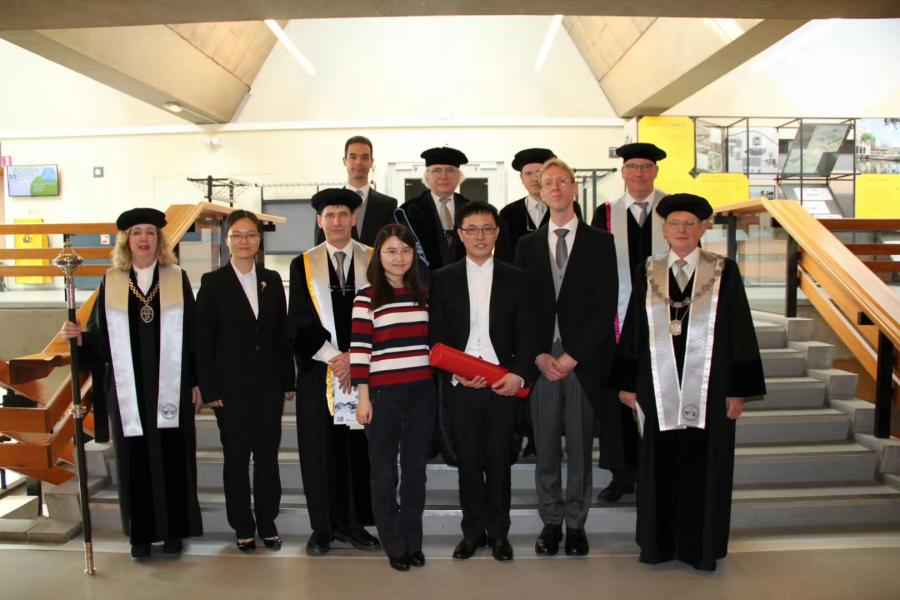
On April 3, 2018, Chao Chen successfully defended his PhD thesis. Chao worked in the Ultrasound ASICs group under guidance of Michiel Pertijs.
Chao's thesis, entitled "Front-End ASICs for 3-D Ultrasound: From Beamforming to Digitization", describes the analysis, design and evaluation of front-end application specific integrated circuits (ASICs) for 3-D medical ultrasound imaging, with a focus on the receive electronics. Chao's work was part of the MICA project.
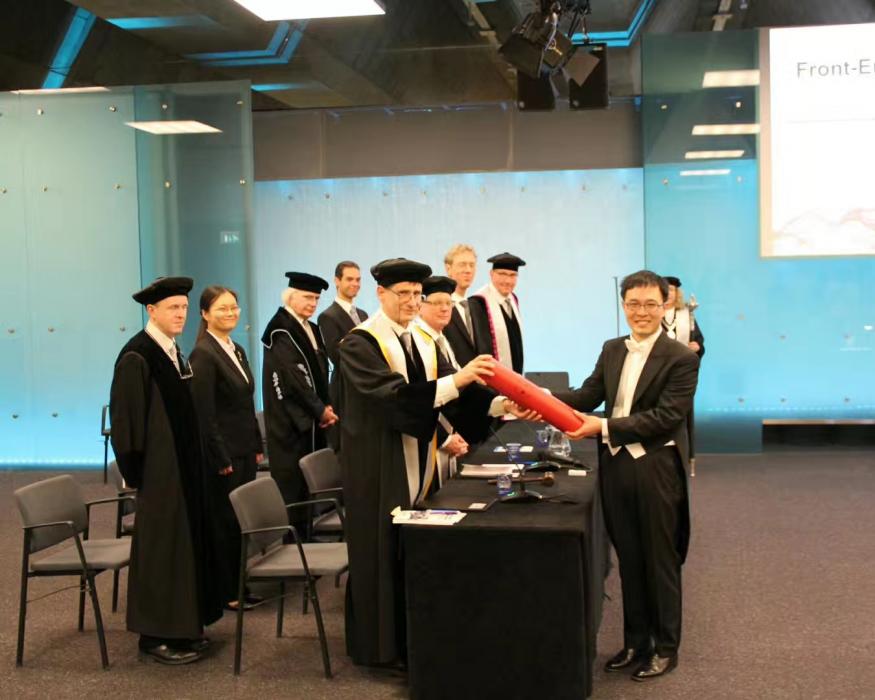
Best MSc Award 2017 goes to Douwe
- Thursday, 30 November 2017
On Thursday 30 November Douwe van Willigen received the best MSc award at the Electronic Instrumentation Laboratory. Four students were nominated for their excellent thesis work: Michele D’Urbino, Douwe van Willigen, Shoubhik Karmakar and Said Hussaini. They presented their work at the Electronic Instrumentation Laboratory and the audience voted for the best student of 2017.
Douwe developed a chip that makes it possible to connect 64 small ultrasound transducers to an imaging system using a single coaxial cable. His work enables 3D acoustic imaging from the tip of a catheter and is a step forward in miniaturizing 3D ultrasound probes. After his MSc Douwe continues in Michiel Pertijs’ group as a PhD candidate, working on electronics for ultrasonic flow measurement.
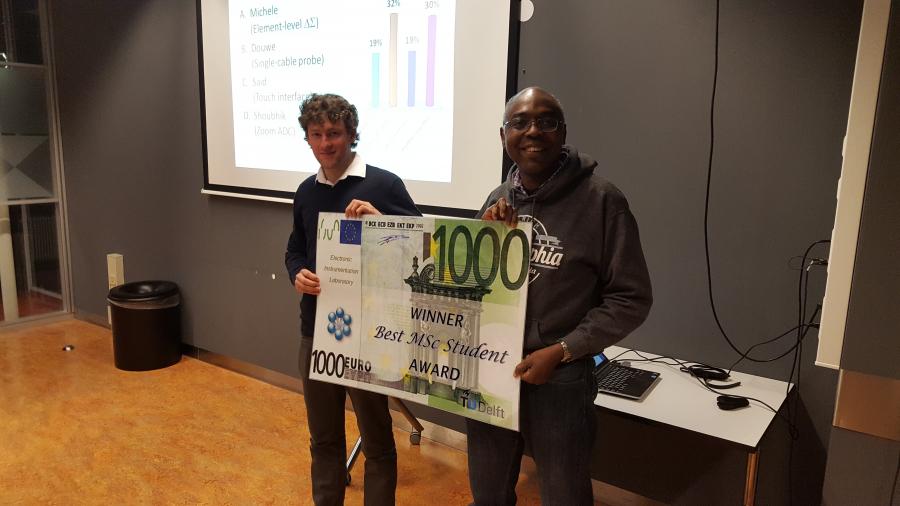
Michele D'Urbino wins the A-SSCC Student Design Contest
- Monday, 13 November 2017
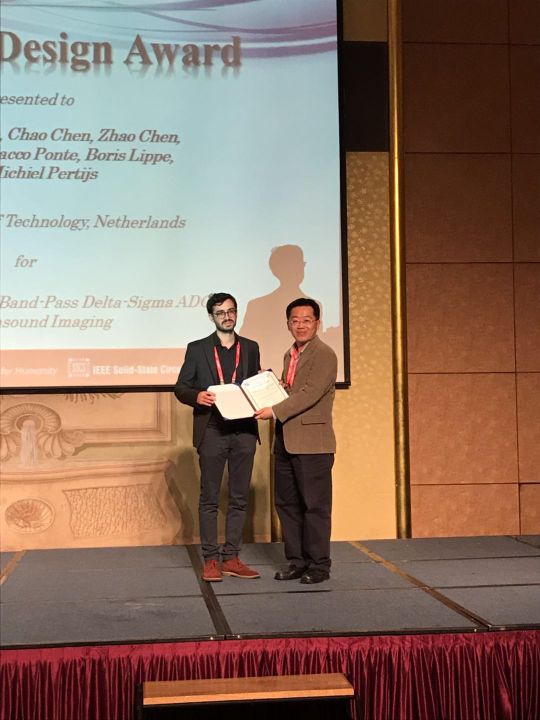
At the 2017 Asian Solid-State Circuits Conference (A-SSCC), Michele D'Urbino won the Student Design Contest with the paper "An Element-Matched Band-Pass Delta-Sigma ADC for Ultrasound Imaging". Michele worked in Michiel Pertijs' group at the Electronic Instrumentation Lab and obtained his MSc Degree earlier this year.
Michele developed an analog-to-digital converter (ADC) capable of digitizing the signals received by every individual element of a 2D ultrasound transducer array. This is an important step towards the realization of next-generation ultrasound probes with full in-probe digitization of the received echo signals. Michele’s ADC has an record-small element-matched size of 150 μm × 150 μm, which is realized by exploiting each piezo-electric transducer element not only as the signal source, but also as the electro-mechanical loop-filter of a continuous-time band-pass ΔΣ ADC.
A-SSCC is a major IEEE Conference on Integrated Circuit Design, and was held in Seoul on Nov. 6-8. At the conference, Michele gave a live demo of his prototype. This work is a collaboration with Oldelft Ultrasound, and was co-authored by Chao Chen, Zhao Chen, Zu-Yao Chang, Jacco Ponte, Boris Lippe and Michiel Pertijs.
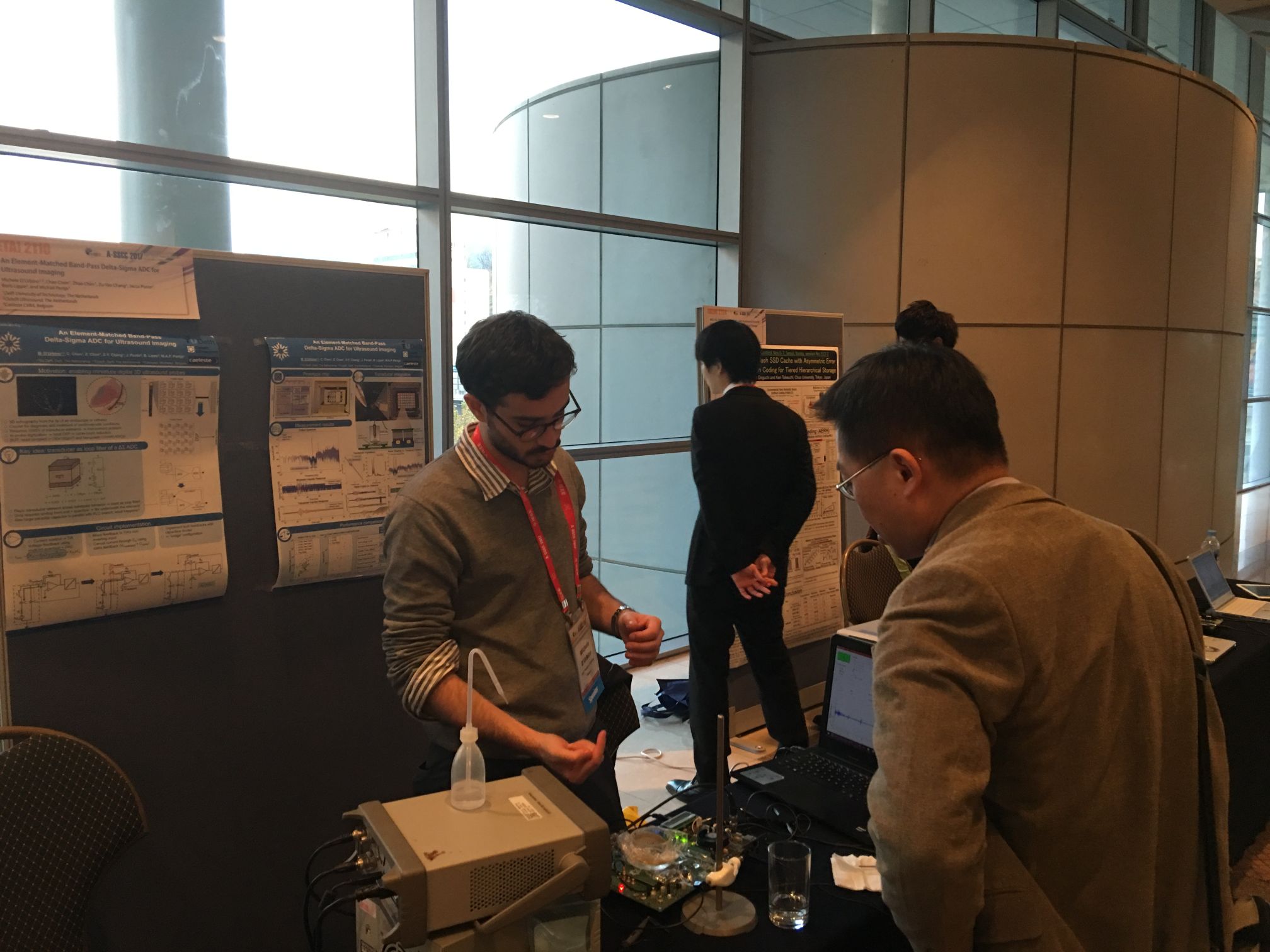
Chao Chen wins Best Student Paper Award
- Thursday, 21 September 2017
At the 2017 IEEE Ultrasonics Symposium in Washington DC, PhD student Chao Chen has won the Best Student Paper Award. Chao works in Michiel Pertijs’ group at the Electronic Instrumentation Lab on integrated circuits for miniature ultrasound probes, in close collaboration with the Acoustical Wavefield Imaging group at TNW, and the Thoraxcenter at Erasmus MC. Chao’s paper describes a chip that makes it possible to connect 1000’s of small ultrasound transducer elements integrated at the tip of an endoscope or catheter to an imaging system. It represents an important step towards the realization of future miniature 3D ultrasound probes. The International Ultrasonics Symposium is IEEE’s main forum for researchers to present new results and learn about recent advances in medical and industrial ultrasonics.
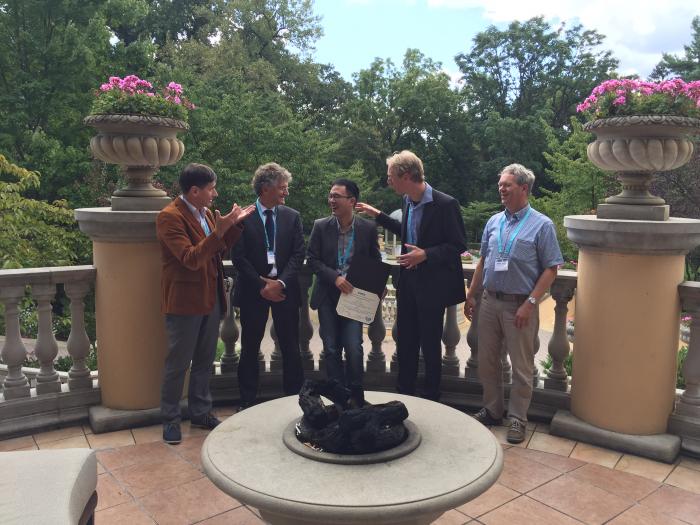
3rd prize for Hui Jiang @ IEEE SSCS chip design contest
- Wednesday, 15 June 2016
Since long, the Benelux has a strong expertise in IC design. To recognize this excellence and to promote chip design among the Benelux EE students, the IEEE SSCS Benelux Chapter organizes a yearly chip design contest for students. This year, the third prize was won by Hui Jiang, for his contribution “Ring-Down-Based Readout Circuit for Resonant Sensors”. Hui received the award at the 2016 SSCS Benelux Workshop, which was held at the University of Twente on June 8. More details on Hui’s award-winning work can be found in the following paper: H. Jiang, Z. Y. Chang and M. A. P. Pertijs, “A 30-ppm <80-nJ Ring-Down-Based Readout Circuit for Resonant Sensors,” IEEE Journal of Solid-State Circuits, vol. 51, no. 1, pp. 187-195, Jan. 2016.
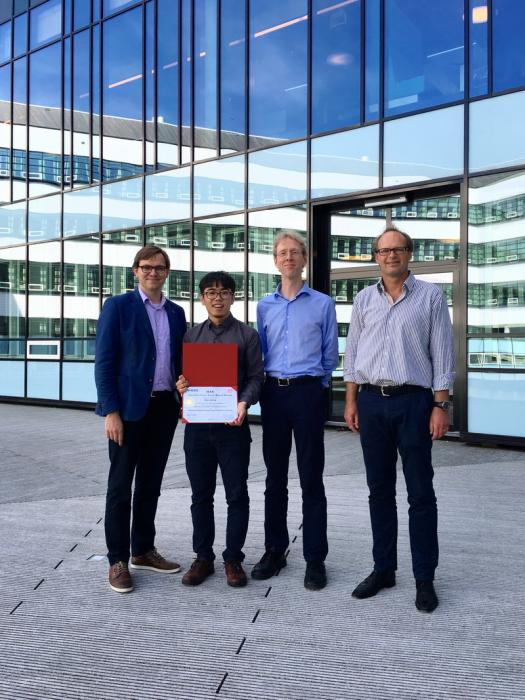
Chao gets the student travel grant @IEEE International Ultrasonics Symposium
- Thursday, 15 October 2015
At the 2015 IEEE International Ultrasonics Symposium in Taipei, Taiwan, Chao received the student travel grant, in recognition of his work on the paper "A single-cable PVDF transducer Readout IC for Intravascular Photoacoustic Imaging".
Pertijs elected Teacher of the Year 2013-2014 of the Electrical Engineering program
- Sunday, 15 February 2015
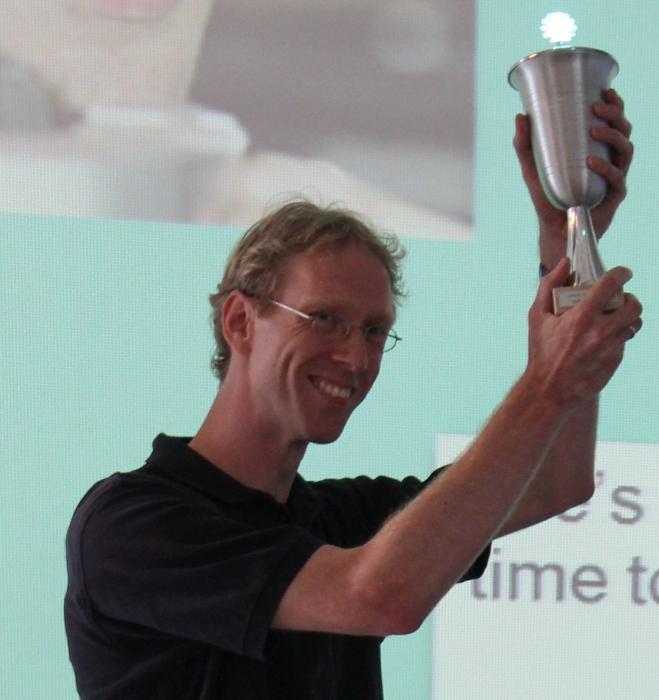
Hui Jiang awarded a ISSCC 2015 Student Travel Grant
- Sunday, 15 February 2015
PhD student Hui Jiang has been awarded a ISSCC 2015 Student Travel Grant of the IEEE Solid-State Circuits Society. This award is a recognition by the Solid-State Circuits Society of his accomplishments as graduate student to the field of solid-state circuits. At ISSCC 2015, Hui presented a paper entitled “A 30ppm <80nJ Ring-Down-Based Readout Circuit for Resonant Sensors”.